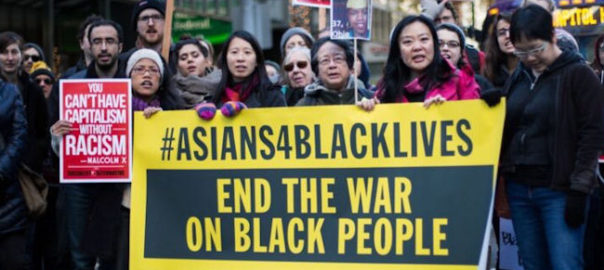By Guest Contributor: Daniel Yu
Asian America is confronted at this moment with a grave responsibility: the responsibility and absolute moral obligation to speak out in support of black lives.
Asian Americans, particularly those of East Asian heritage, exist at an intersection of privilege and marginalization. A person like myself — a middle-class Chinese American and a son of educated immigrants — faces distinct challenges from structural racism. Acknowledging this does not relinquish the validity of our own struggle nor does it dismiss the injuries we endure from white supremacy. Instead, it recognizes that the project to dismantle white supremacy requires us to stand against white supremacy, which threatens us as well as the very existence of our Black and Brown brethren.
The project to dismantle white supremacy requires us to stand against white supremacy, which threatens us as well as the very existence of our Black and Brown brethren.
The confounding duality of the Asian American existence, as exemplified by our privilege or by our cultural liminality, is a painful source of conflict and division. But that duality is crucial to our purpose and our responsibility in the fight for the lives of people of color. We are afforded a particular vantage point, one which allows us to mobilize the most useful tools of both our privilege and our understanding of racism. We are in a position where our eternal existence at the fringes of racial discourse — our long-standing invisibility that comes by virtue of our being both American and yet stereotyped as not — is now directly confronted by this country’s existential crisis. The particular limbo of quasi-being that has long positioned the Asian American community as a wedge between Black and white Americans in the service of upholding a white hegemony must be repurposed. We must no longer accept the perversion of our community into the cudgel with which other non-white Americans are beaten. We must no longer accept the anti-Blackness within our own community. Our limbo must be leveraged against white supremacy.
Sadly, the relationship between Asian and Black Americans has, for many decades, been far from sanguine. Animosity has colored the dialogue between us, in no small part due to the complicity of Asian America in the systems of oppression against communities of color in this country. The Asian American police officer involved in the death of George Floyd brings this complicity and its ramifications into sharp relief, but it is only the latest manifestation of a tragic continuity embodied by the deaths of Akai Gurley and Latasha Harlins. Friction and antipathy between our communities is a deeply-rooted blight, and in the face of such some Asian Americans question why we must stand in solidarity. Some would ask: with the targeting of Asian Americans in the wake of COVID, why should we not be putting ourselves first?
Justice is not about reciprocity. Solidarity is not a function of quid pro quo; it is a matter of integrity.
Justice is not about reciprocity. Solidarity is not a function of quid pro quo; it is a matter of integrity. Our interest in speaking out for Black lives should not be because we expect to receive support in return. Instead, we should speak out of a moral responsibility to uphold fundamental human dignity. To ignore the plight of other communities of color is to condemn them; it is unethical. Self-interest is only justifiable insofar as it ensures one’s own safety and means of life; to that end, the targeting of Asian American individuals and businesses is reprehensible. But such injury and insult does not justify our community as a whole recusing ourselves from our obligation to fight for Black and Brown lives.
There is a distinction between non-racism and anti-racism; non-racism is inactive, passive, and untenable in an environment of active oppression. Anti-racism requires more of us. It necessitates that we interrogate the anti-blackness endemic to our communities. We must hold ourselves and those surrounding us accountable. We must confront our failures. Such painful conversations are long-neglected but entirely necessary. Asian America has for far too long clung to the fantasy of white mobility, the malicious lie that by buying into white supremacy we might be afforded its prestige. In pursuit of whiteness we have disregarded our BIPOC brethren, debased ourselves, become tools of systemic injustice, and all for the realization that white America will not treat us as equals. It is past time for Asian America to reclaim its dignity and to cease predicating itself on the validation of whiteness. It is past time for solidarity with communities of color. But it is, I hope, not too late for us to remove the blindfold.
Let it be spoken with conviction, without self-consciousness. Let it be spoken out of empathy and righteous anger. Let it be spoken with truth, and with the knowledge that we will fight.
Let it be spoken:
Black lives matter.
Daniel Yu is based in the Pacific Northwest with a background in visual media, critical theory, and urban studies. Interests include social justice, film theory, literature, psychology, and political activism.
Learn more about Reappropriate’s guest writing program and submit your work here.

